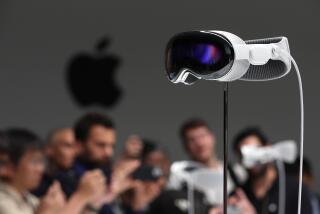The Cutting Edge: Computing / Technology / Innovation : Report Urges Expanded Government Role in Virtual Reality Research
- Share via
Virtual reality was born in military research labs, but now that the Cold War is over, scientists are looking for new reasons to keep the dollars flowing for a technology whose development has largely been taken over by private industry.
In a report released this week--sponsored by a consortium of federal agencies--the National Research Council recommends that the government get into virtual reality research in a big way. The goal is to foster a fledgling technology that could lead to such futuristic wonders as endoscopic surgery by remote, and cheap exploration of outer space via telerobotics.
But the recommendations raise questions about what the role of the government should be in a new industry that has already spawned dozens of start-up companies and fierce competition for yet-to-materialize markets.
“My view is that the government should stay way out of the whole thing,” said Stan Kinsey, chief executive of Iwerks, a Burbank-based entertainment start-up that has invested heavily in creating virtual reality attractions for theme parks. “The free market works great. The consumer judges and people make free-market decisions, and the respective disciplines put resources in the right, applicable industries.”
Virtual reality--the ephemeral subset of computer technology that makes it possible to feel, really feel, like you’re someplace that you’re not--has lately been driven largely by the entertainment industry’s efforts to create more and more sophisticated illusions for consumers in search of leisure-time escape from the real world.
VR props include goggles, gloves, vests and other computer-driven tracking devices that connect to a display and a 3-D database to create a sense of immersion in a virtual world. But today’s equipment has been known to make users drowsy, nauseated and disoriented.
And the committee of scientists and academics that put together the Research Council report said that entertainment industry uses of virtual reality for video games and rides requires lower image quality and slower response time than would be necessary for medical applications such as surgery or industrial uses such as automobile design.
“We felt the government needed to push in the development of the kinds of equipment that the person has to wear, because that would probably not be addressed by the entertainment industry,” said Anne Mavor of the NRC, co-editor of the study. “Our charge was to point out where we felt the major gaps in the technology were that are not being addressed by the private sector.”
The main area in which the committee recommended a “major unified research program” was in virtual reality software, where the studies’ authors perceived a lack of research in technologies that would provide sensory experiences for sound and touch, as well as imaging.
“Computer hardware probably will be developed through commercial market forces if current trends continue; however, should serious lags in development occur, the government might then consider strategies for leveraging private-sector development efforts,” the report says.
That possibility--and the report’s allusion to federally set compatibility standards--does not sit too well with Linden Rhoads, co-founder of Seattle-based Virtual I/O, a start-up backed by Logitech and cable operator Tele-Communications Inc. The firm plans to release its first product--a set of light glasses that plug into a television or personal computer and create a large floating picture that “tracks” with the user’s movements--this Christmas.
“Would the public have been served if the government had stepped in and set standards for the operating systems of personal computers? I don’t think so,” said Rhoads, whose firm’s core technology, in a typical pattern, grew out of a grant from the Army. “The market naturally produces higher- and higher-quality products. If I go ahead with this, there’ll be someone else saying they can do it better. So I’m inspired to do the best I possibly can.”






